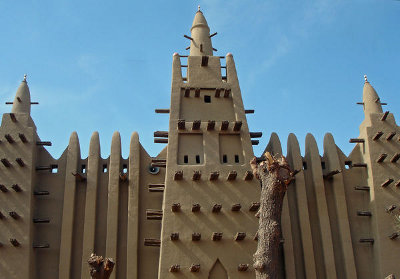
Timbuktu is noted for its adobe architecture.

A hardline religious group occupying northern Mali has destroyed 15th-century mausoleums of Sufi Muslim saints in Timbuktu and have threatened to demolish the remaining 13 UNESCO world heritage sites in the fabled city, witnesses have said.
The attack by Ansar Dine group on Friday came just four days after UNESCO placed Timbuktu on its list of heritage sites in danger after the seizure of its northern two-thirds in April by rebels.
“They have already completely destroyed the mausoleum of Sidi Mahmoud (Ben Amar) and two others. They said they would continue all day and destroy all 16,” Yeya Tandina, a local Malian journalist, said by telephone.
“They are armed and have surrounded the sites with pick-up trucks. The population is just looking on helplessly,” he said, adding that the Islamists were currently taking pick-axes to the mausoleum of Sidi El Mokhtar, another cherished local saint.
“It looks as if it is a direct reaction to the UNESCO decision,” Timbuktu deputy Sandy Haidara said by telephone, confirming the attacks.
The Islamist Ansar Dine group backs strict sharia, Islamic law, and considers the shrines of the local Sufi version of Islam idolatrous.
“Ansar Dine will today destroy every mausoleum in the city. All of them, without exception,” Sanda Ould Boumama, the group’s spokesman, told AFP news agency through an interpreter from the city.
“God is unique. All of this is haram (or forbidden in Islam). We are all Muslims. UNESCO is what?” he said, declaring that Ansar Dine was acting “in the name of God”.
UNESCO condemnation
The UN cultural agency UNESCO on Saturday deplored the “tragic” destruction called for the rampage to stop.
“This is tragic news for us all,” UNESCO executive committee chair Alissandra Cummins said in a statement issued to the AFP news agency.
“I appeal to all those engaged in the conflict in Timbuktu to exercise their responsibility.”
“Since government forces were routed in April, Ansar Dine and other Islamist groups with links to Al-Qaeda in the Islamic Maghreb (AQIM) have gained the upper hand over less well-armed Tuaregs whose goal is a secular, independent northern state.
The saint’s 15th-century tomb was also desecrated by extremists in May after armed fighters seized control of the vast desert north following a March coup in Bamako.
Beyond its historic mosques, the World Heritage site of Timbuktu, once a cradle of Islamic learning, has 16 cemeteries and mausolea, according to the UNESCO website.
Sometimes called the city of 333 saints, Timbuktu is also home to nearly 100,000 ancient manuscripts, some dating back to the 12th century, preserved in family homes and private libraries under the care of religious scholars.
At its height in the 1500s, the city, a Niger River port at the edge of the Sahara 1,000km north of Bamako, was the key intersection for salt traders travelling from the north and gold traders from the south.



